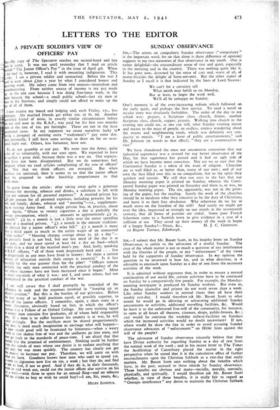SUNDAY OBSERVANCE
Sta,—The letters on compulsory Sunday observance ("compulsory " is the important word, for on that alone is there difference of opinion) suggests to me two memories of that observance in my youth. One is rather delightful—the extraordinary sense of rest and quiet, especially in the morning and in the country. There was nothing quite like it. It has gone now, drowned by the noise of cars and, worst of all, of motor-bicycles the delight of farm-servants. But the other aspect of Sunday as I recall it is that indicated by the lines of Lord Neaves: We can't for a certainty tell What mirth may befall us on Monday, But at least, to begin the week well, We'll all be unhappy on Sunday.
One's memory is of the ever-increasing tedium which followed on the early quiet, and perhaps the first service. To read a novel or
secular story was absolutely forbidden. The order of the day in my school was: prayers, a Scripture class, church, dinner, another Scripture class, church, supper, prayers. Walking into church in the evening one could see, as one can still, what Sunday evening meant and means to the mass of people, an endless, aimless wandering about the streets and neighbouring roads, which was definitely not con- ducive to morals. " I am a lover of public entertainments," said Dr. Johnson (or words to that effect), " they are a counteractive to vice."
We have abandoned the once not uncommon contention that our industrial supremacy was a reward for our better observance of the Day, for that supremacy has passed and it had an ugly side of which we have become more conscious. Nor are we so sure that the Continental Sunday is a token of the want of religion. Churches are as well filled as, or better than, many of our own ; and of our own the best filled owe this to no compulsion, but to the spirit they quicken and sustain. We still shut our eyes to the fact that our Monday morning paper is printed on Sunday, whereas the Conti- nental Sunday paper was printed on Saturday and there is, or was, no Monday morning paper. The sin, apparently, was not in the print- ing of the paper, but the reading. Surely the work of the churches should be to inculcate what they conceive to be the duty of Christians, and leave it to their free obedience. Why otherwise do we lay so much stress on the freedom of the will? And surely we might get over the idea, impressed so strongly on our minds in the seventeenth century, that all forms of pastime are sinful. Some poor French fishermen came to a Scottish town to give evidence in a case of a collision at sea. They saved up their money all the week in hopes
of a happy Sunday!—Yours, &c., H. J. C. GRIERSON. 12 Regent Terrace, Edinburgh.






























 Previous page
Previous page